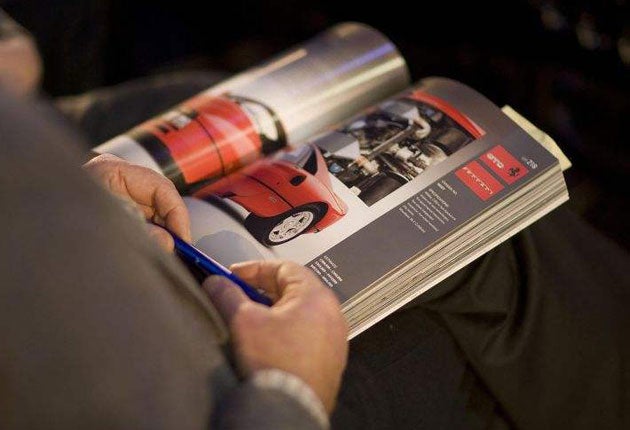Buyers can drive away a bargain – or find they're on a highway to hell
Plunging prices are tempting motorists to auction rooms. But there are pitfalls for the unwary, finds Julian Knight

Your support helps us to tell the story
From reproductive rights to climate change to Big Tech, The Independent is on the ground when the story is developing. Whether it's investigating the financials of Elon Musk's pro-Trump PAC or producing our latest documentary, 'The A Word', which shines a light on the American women fighting for reproductive rights, we know how important it is to parse out the facts from the messaging.
At such a critical moment in US history, we need reporters on the ground. Your donation allows us to keep sending journalists to speak to both sides of the story.
The Independent is trusted by Americans across the entire political spectrum. And unlike many other quality news outlets, we choose not to lock Americans out of our reporting and analysis with paywalls. We believe quality journalism should be available to everyone, paid for by those who can afford it.
Your support makes all the difference.Sales of new cars are reversing at speed as the credit crunch and recession hit home – a development illustrated by the job losses ripping through the motor industry.
And what happens at the top of the car market inevitably feeds down the chain. Prices for second-hand vehicles have been plunging and particularly so in the auction rooms. Usually the preserve of the trade dealers, these now offer the general public the opportunity to snap up a bargain motor.
"We have seen substantial price falls. Cars fetching £6,500 a year ago are now going for around £5,000," says Tim Naylor, a spokesman for British Car Auctions, which has 21 outlets across the UK and sells an average of 10,000 to 12,000 vehicles a week.
But the pattern, it seems, isn't uniform across the board. "The four by fours and prestige cars have fallen further than 15 per cent. On the flipside, the value of small cars and more environmentally friendly models, such as the Toyota Prius, have done well. You are able to get a lot of car for your money," adds Mr Naylor.
Lower prices are bringing out the bargain hunters: "Most of our business is trade but we're now seeing interest from private buyers as the word has got around that prices are low, particularly on real prestige makes."
There are dozens of auction rooms around the country, each holding sales a couple of times a week. However, as far as private buyers are concerned, it seems that only fools rush into car auctions. "Yes there are bargains out there at the moment, but also lots of traps for the unwary," says Vanessa Guyll, technical specialist at the AA. "There are real horror stories which emerge from the world of auctions – from stolen vehicles to buying a dud. You need to take care."
Mr Naylor warns against the uninitiated just turning up and bidding on what takes their fancy. "Auction sales are frenetic affairs. The hammer falls on a lot every 45 seconds on average. If you don't know what you are doing, it can be bewildering," he says.
Both Ms Guyll and Mr Naylor urge individual buyers to come to an auction prepared and with expertise on tap. "Bring a mechanically minded friend along with you to the auction to check things over," says Ms Guyll. "Also, so you don't pay over the odds, look at the Parkers car guide to see how much particular models are selling for. And set yourself a budget."
Mr Naylor stresses that it is important to spend as long as possible with the car: "Be clear about the type that you want, turn up a good hour before the auction starts, focus on a couple of vehicles and then make sure you look outside and inside and start it up. There are no test drives."
As for the auction house itself, check that it's a member of the Society of Motor Auctions; Ms Guyll warns against taking part in small backstreet sales. Also check the auctioneer's sales charge is no more than 2 or 3 per cent.
The protection on offer to purchasers at auction is far less than that available through a dealer. Cars are either sold "as seen" – which means no comeback – or with a few hours' warranty. That gives you the chance to take the vehicle you've just bought out for a quick spin, to check it is as described by the auctioneer.
There are other longstanding problems with some cars sold at auction. These include vehicles that have been stolen at some stage in the past, so- called "cut and shuts" (two separate cars welded together) and models still subject to hire-purchase agreements. There is also the menace of "clocking", where the mileage is turned back.
If you buy a stolen car or one that has hire purchase still outstanding, the vehicle will never actually be yours; it will belong to the rightful owner from whom it was taken, or to the loan company. "Its crucial to be sure of what you're buying," says RAC spokeswoman Lucy Haughey. "The auction house should ask the seller to sign a declaration, but you should approach everything with caution."
You can check a car's history prior to purchase. For £14.99 a time (or £19.99 for three vehicles), you can use the RAC's data check service (0800 975 5867). This will tell you if the car has been stolen, has finance outstanding or is a write-off. The mileage will also be checked with DVLA.
Join our commenting forum
Join thought-provoking conversations, follow other Independent readers and see their replies
Comments